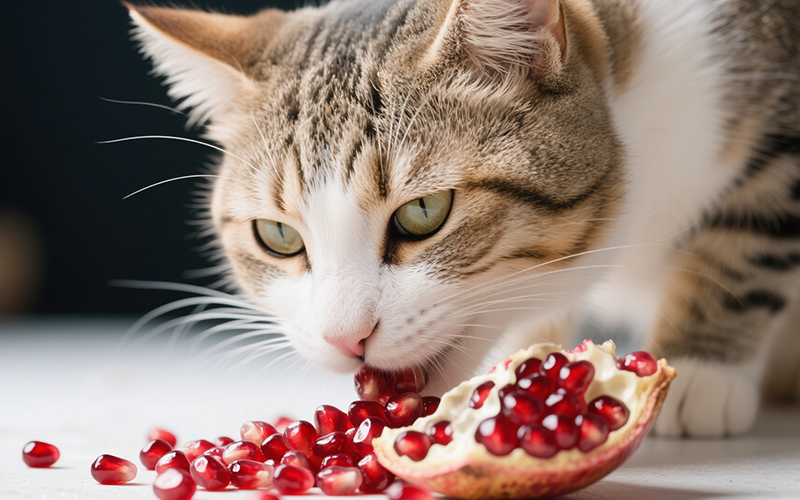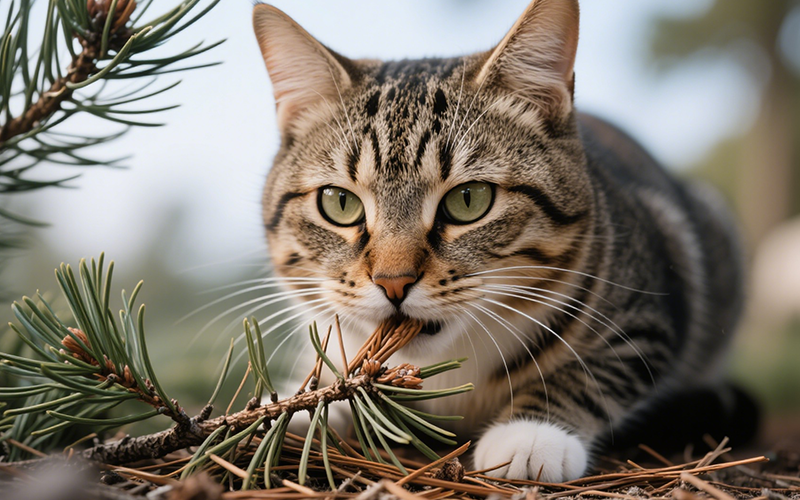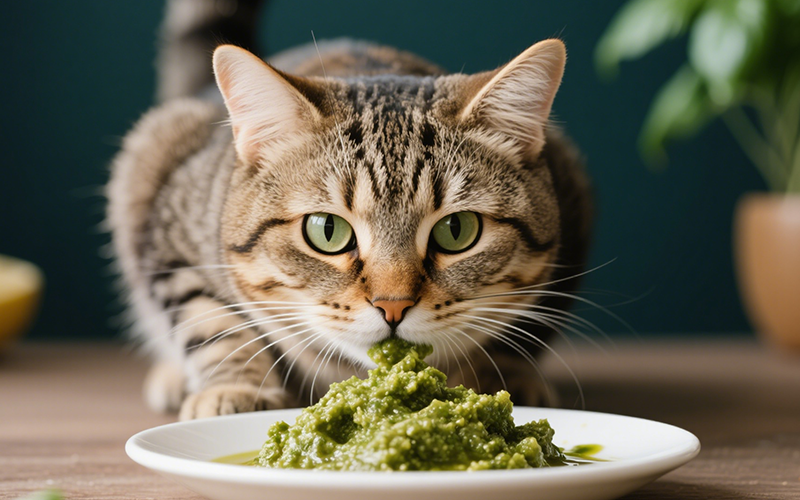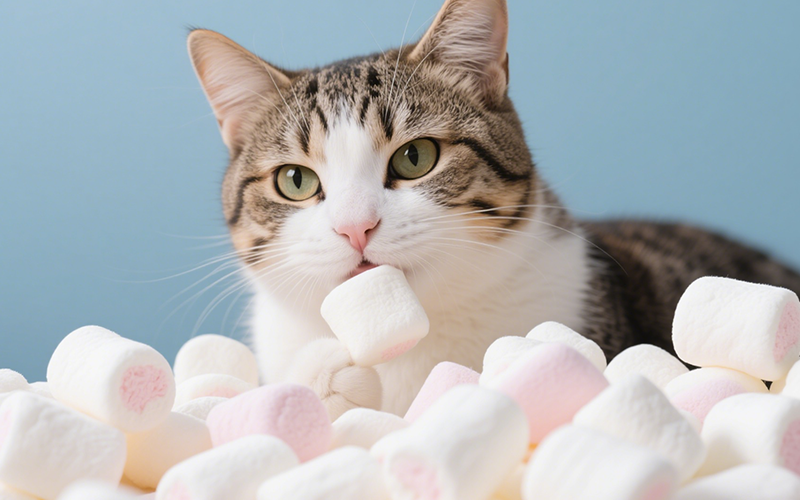Unlock the Juicy Truth: Can Cats Eat Kiwi Fruit Safely? A Vet-Reviewed Guide
- 11 Apr 2025 15:48
As loving cat parents, we often find ourselves wondering if we can share our favorite snacks with our feline companions. That bright green, sweet, and tangy kiwi fruit sitting on your counter might look tempting, but the big question looms: can cats eat kiwi fruit? It's a common query, driven by our desire to offer varied treats and perhaps share something healthy. However, when it comes to feline nutrition, what's healthy for humans isn't always safe or beneficial for our furry friends. Cats have unique dietary requirements, being obligate carnivores, meaning their bodies are designed to thrive on meat-based diets.
This comprehensive guide dives deep into the topic, exploring the potential risks and minimal benefits of offering kiwi to your cat. We'll look at the nutritional profile of kiwi, compare it to a cat's needs, discuss safety precautions, and offer expert insights to help you make an informed decision. Our goal is to provide trustworthy, authoritative information grounded in veterinary knowledge and feline biology, ensuring you prioritize your cat's health and well-being above all else.

Kiwi Fruit: A Nutritional Snapshot (for Humans)
Before assessing if kiwi is suitable for cats, let's understand what it offers humans. Kiwis are renowned for being nutritional powerhouses, packed with:
Vitamin C: A potent antioxidant crucial for immune function.
Vitamin K: Important for blood clotting and bone health.
Vitamin E: Another antioxidant protecting cells from damage.
Potassium: Essential for fluid balance and nerve signals.
Fiber: Aids digestion and promotes gut health.
Antioxidants: Helps combat oxidative stress.
Actinidin: An enzyme that can aid protein digestion (and also cause mild mouth irritation in some sensitive individuals).
This profile makes kiwi a fantastic addition to the human diet. But does any of this translate into benefits for our feline friends?
Feline Nutrition 101: Why Cats Are Different
Understanding the fundamental dietary needs of cats is paramount before considering *any* non-traditional food item, including kiwi. Cats are obligate carnivores. This isn't just a preference; it's a biological imperative. Their entire physiology is optimized for processing meat.
Key aspects of feline nutrition include:
High Protein Requirement: Cats need significantly more protein than dogs or humans, primarily animal-based protein, to maintain muscle mass, enzyme function, and overall health.
Specific Amino Acids: They require essential amino acids like taurine and arginine, found abundantly in animal tissues but scarce in plants. Deficiencies can lead to severe health problems like heart disease (dilated cardiomyopathy) and blindness.
Fat as Energy: Animal fats are a crucial energy source and provide essential fatty acids vital for skin, coat, and overall health.
Limited Carbohydrate Need: Cats have minimal physiological need for carbohydrates. Their digestive system isn't well-equipped to efficiently process large amounts of plant matter or sugars.
Vitamin Requirements: They need pre-formed Vitamin A (found in animal sources like liver) as they cannot efficiently convert beta-carotene from plants.
Given these specific needs, it becomes clear that fruits like kiwi, while rich in vitamins and fiber for humans, don't align with a cat's core nutritional requirements. They lack the essential animal-derived nutrients cats depend on.
Can Cats Eat Kiwi Fruit: The Direct Answer and Nuances
So, let's address the core question directly: Can cats eat kiwi fruit? The general consensus among veterinary professionals is that **kiwi fruit is not toxic to cats**, but it's also **not recommended** as a regular part of their diet.
In extremely small quantities, a tiny piece of kiwi flesh (without skin or seeds) is unlikely to cause serious harm to most healthy adult cats. However, "not toxic" doesn't equate to "good for them" or even "safe in all circumstances." Several potential risks and a general lack of significant benefits make kiwi a questionable treat choice for felines.
Think of it this way: while a small bite might not poison your cat, it offers negligible nutritional value relevant to their needs and introduces unnecessary elements like sugar and fiber that their digestive systems aren't designed to handle well.
Potential (But Minimal) Benefits of Kiwi for Cats
While not a significant source of feline-appropriate nutrition, could there be any minor upsides to a tiny taste of kiwi?
Fiber Content: The fiber in kiwi *might* theoretically aid digestion in minuscule amounts, potentially helping with mild constipation. However, there are far safer and more effective ways to increase fiber in a cat's diet if needed, such as specific veterinary-approved supplements or high-fiber cat foods. Relying on kiwi for fiber is inefficient and risky.
Water Content: Kiwi has high water content, which could contribute fractionally to hydration. But again, fresh water should always be the primary source of hydration for cats.
Antioxidants: While cats benefit from antioxidants, those found in kiwi are not tailored to their specific needs, and the amount in a tiny, safe-to-consume piece would be negligible. Species-appropriate diets are formulated with the necessary antioxidants.
It's crucial to reiterate that these potential benefits are minimal and theoretical. They are heavily outweighed by the potential risks and the fact that a balanced, high-quality commercial cat food or a properly formulated raw/home-cooked diet (under veterinary guidance) provides all the necessary nutrients, including fiber and antioxidants, in the correct forms and amounts.
Risks and Concerns: Why Kiwi Might Be Bad for Cats
This is the most critical section for responsible cat owners. Offering kiwi, even in small amounts, isn't without potential downsides.
1. Gastrointestinal Upset
This is the most common risk. A cat's digestive system is sensitive to foods outside its normal carnivorous diet.
Acidity: Kiwi fruit is acidic, which can irritate a cat's stomach lining, potentially leading to vomiting or discomfort.
Sugar Content: While natural, the sugar (fructose) in kiwi is unnecessary for cats and can cause digestive upset like diarrhea. Excessive sugar intake over time can also contribute to obesity and potentially diabetes.
Fiber Overload: While a small amount of fiber can be okay, too much introduced suddenly can disrupt the gut balance, leading to diarrhea, gas, or constipation.
2. Choking Hazard
Seeds: Kiwi seeds are small but numerous. While unlikely to cause toxicity, they could theoretically pose a choking risk, especially for smaller cats or kittens.
Skin: The fuzzy skin of the kiwi is tough, fibrous, and difficult for cats to digest. It presents a significant choking hazard and can potentially cause intestinal blockage if ingested. It may also harbor pesticides. Kiwi skin is unsafe for cats.
3. Allergic Reactions
While less common, some cats might have an allergic reaction to kiwi fruit, just as they can to any new food item. Symptoms could include itching, skin rashes, swelling, or respiratory issues. The enzyme actinidin, while known for aiding human digestion, could also be a potential allergen or irritant for sensitive cats.
4. Unnecessary Calories and Sugar
Cats have very specific caloric needs. Treats should make up no more than 10% of their daily caloric intake. Kiwi provides 'empty' calories for a cat – calories without the essential nutrients they require. The sugar content, as mentioned, is detrimental in the long run, contributing to weight gain and associated health problems.
5. Pesticide Residue
Unless you are offering organic kiwi and have thoroughly washed it, the skin can carry pesticide residues, which are harmful to cats. This is another reason why the skin must always be removed.
Considering these risks, the question shifts from "can cats eat kiwi fruit?" to "should cats eat kiwi fruit?". For most veterinary experts, the answer leans heavily towards no, or at least, not without extreme caution and infrequency.
How to Safely Offer Kiwi (If You Absolutely Must)
If, after understanding the risks, you still wish to offer your cat a minuscule taste of kiwi as a very rare treat, follow these steps meticulously to minimize potential harm:
Consult Your Veterinarian First: This is non-negotiable. Discussing it with your vet is crucial, especially if your cat has any pre-existing health conditions like diabetes, kidney disease, or a sensitive stomach. They can provide personalized advice.
Preparation is Key:
Wash the kiwi thoroughly.
Completely remove the fuzzy skin.
Cut a very small piece of the fleshy fruit.
Ensure there are absolutely no seeds in the piece you offer.
Tiny Portion Size: Offer only a pea-sized amount or less. This is a taste, not a meal or a significant treat.
Frequency: Extremely Rare Occasion: This should not be a regular occurrence. Think once in a blue moon, if at all. It should never replace their normal species-appropriate food or treats.
Supervision and Monitoring: Watch your cat closely after they ingest the kiwi. Look for any signs of adverse reactions (see below) over the next 24-48 hours.
Introduce Slowly: Never introduce multiple new foods at once. If you offer kiwi, ensure it's the only new thing in their diet at that time so you can pinpoint the cause if a reaction occurs.
Remember, safe feeding of kiwi to cats involves strict adherence to these guidelines, and even then, risks remain.
Signs of Adverse Reaction to Kiwi
If you've offered kiwi and suspect your cat is having a negative reaction, watch for these signs:
Vomiting
Diarrhea or loose stools
Lethargy or decreased activity
Loss of appetite
Abdominal pain or discomfort (hunched posture, reluctance to be touched)
Excessive drooling
Signs of an allergic reaction (itching, scratching, skin redness, swelling, difficulty breathing - seek immediate vet care for respiratory issues)
If you observe any of these symptoms, stop offering kiwi immediately and consult your veterinarian.
Safer and More Appropriate Treat Alternatives for Cats
Instead of experimenting with fruits like kiwi, why not offer treats that are both safe and beneficial for your obligate carnivore?
Commercial Cat Treats: Choose high-quality treats that are low in calories and carbohydrates and specifically formulated for cats. Look for meat-based ingredients.
Small Pieces of Cooked Meat: Unseasoned, cooked chicken, turkey, or fish (ensure no bones) are excellent protein-rich treats.
Freeze-Dried Meat Treats: Single-ingredient options like freeze-dried chicken, salmon, or minnows are often highly palatable and species-appropriate.
Catnip: While not a food, many cats enjoy catnip as an occasional stimulant treat.
Cat Grass: Growing cat grass (usually oat, wheat, or barley grass) can provide safe greens for cats to nibble on, potentially aiding digestion.
Veterinary Dental Treats: Some treats are designed to help maintain dental hygiene.
These alternatives align much better with a cat's natural diet and are far less likely to cause digestive upset or other health issues compared to offering kiwi fruit to your cat.
Expert Opinion: The Veterinary Perspective on Cats and Kiwi
Most veterinarians emphasize the importance of a species-appropriate diet for cats. While acknowledging that kiwi isn't toxic, they generally advise against feeding it to cats due to the lack of nutritional benefit and the potential for gastrointestinal upset. The sugars and fiber content are often highlighted as concerns. The prevailing advice is always to prioritize balanced commercial cat foods or vet-approved diets and to use species-appropriate items for treats. When in doubt about any food, the safest course of action is always to consult with a trusted veterinarian who understands your specific cat's health history and needs.
Kiwi for Cats: Quick Summary Table
| Aspect | Information Regarding Cats and Kiwi |
| Toxicity | No, kiwi fruit is generally considered non-toxic to cats. |
| Recommended? | No, generally not recommended by veterinarians due to lack of benefits and potential risks. |
| Potential Benefits | Negligible (minor fiber/water content); better sourced elsewhere. |
| Primary Risks | Gastrointestinal upset (vomiting, diarrhea due to sugar, fiber, acidity), choking hazard (skin, seeds), potential allergic reaction. |
| Safe Parts | Only the ripe flesh, in minuscule amounts. |
| Unsafe Parts | Skin (choking/blockage/pesticide risk) and seeds (choking risk). |
| Safe Portion Size | Pea-sized amount or less, extremely infrequently. |
| Preparation | Wash thoroughly, remove ALL skin and seeds, offer only flesh. |
| Key Consideration | Cats are obligate carnivores; fruit is not part of their natural diet. Always consult your vet. |
Concerned About Your Cat's Diet or Health? Try PettureX!
Navigating feline nutrition and health can be complex. If you're ever unsure about what's safe for your cat, or if you notice any unusual symptoms after they've eaten something new, having quick access to reliable information is key.
We recommend checking out the PettureX App. This innovative tool offers amazing features for pet parents:
Image Recognition: Simply snap a photo to identify your pet's breed or get preliminary insights into potential health issues based on visual cues (like skin conditions).
24/7 AI Vet Consultation: Have pressing questions about diet (like "can cats eat kiwi fruit?") or worried about a symptom? PettureX offers AI-powered veterinary consultations around the clock, providing quick answers and guidance on when to seek in-person vet care.
Health Tracking: Monitor your pet's health records and get personalized tips.
PettureX can be a valuable resource for immediate concerns and general pet care knowledge, complementing regular veterinary check-ups. Download it today to empower your pet parenting journey!
Conclusion: Prioritize Feline Needs Over Fruity Treats
In conclusion, while the answer to "can cats eat kiwi fruit?" is technically yes (it's not poisonous), the more important answer is that they probably shouldn't. Kiwi offers no significant nutritional benefits to obligate carnivores and introduces potential risks like digestive upset, choking hazards, and unnecessary sugar intake. The fuzzy skin and small seeds present definite dangers that must be avoided entirely.
Always prioritize your cat's health by feeding them a balanced, species-appropriate diet formulated to meet their unique carnivorous needs. Choose safe, meat-based treats instead of human foods like fruit. Before introducing *any* new food item, even as a tiny treat, consulting your veterinarian is the safest and most responsible course of action. They can provide guidance based on your individual cat's health profile, ensuring your feline friend stays happy, healthy, and safe.
Related

Pomegranate Peril: Can Cats Eat the Seeds Safely? A Vet-Reviewed Guide
- 25 Apr 2025
Prickly Problem: Can Cats Eat Pineapple Leaves Safely? A Vet-Reviewed Risk Analysis
- 25 Apr 2025
The Prickly Truth: Can Cats Eat Pine Needles Safely? A Guide for Concerned Owners
- 24 Apr 2025
Pesto & Paws: A Dangerous Mix? Can Cats Eat Pesto Safely?
- 24 Apr 2025
Persimmons and Paws: Can Cats Safely Eat This Autumn Fruit? A Vet-Reviewed Guide
- 23 Apr 2025
Nutritional Yeast for Cats: Savory Sprinkle or Health Hazard? A Vet-Reviewed Guide
- 23 Apr 2025
Marshmallows and Cats: A Puffy Problem? Why Vets Say No to This Sugary Snack
- 22 Apr 2025
Kefir for Kitties? A Veterinarian-Reviewed Guide to Safety, Benefits & Risks
- 22 Apr 2025
The Burning Question: Can Cats Eat Jalapenos? A Comprehensive Safety Guide
- 21 Apr 2025
Cool Temptation: Can Cats Eat Ice Cream Safely? The Vet-Backed Truth
- 21 Apr 2025
